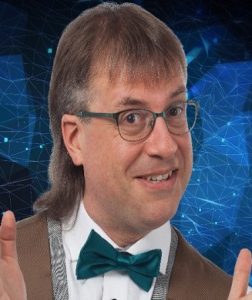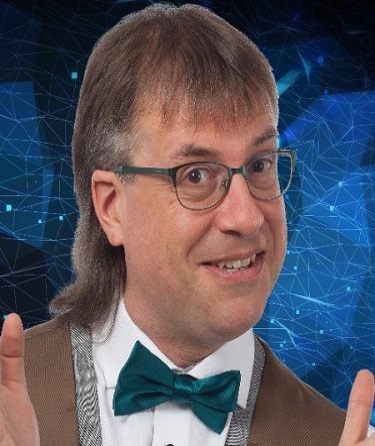Interview with Sylvain Rochon (Co-Founder, CykoMetrix)

1. Tell us about your journey
I started off taking on the normal path of education towards getting a good career. I thought I was going to become a scientist at first, due to my interest in understanding everything in the universe, but my life brought me elsewhere. Even before that, I remember when I applied for university, I had two options: theater or biotechnology.
I loved both subjects and activities.
I chose the latter because of the stronger potential for a diverse and successful career.
I did my studies at Ottawa University and ended up doing a specialization in biotechnology, which involved doing 2, 4-year bachelor’s degrees in about 5.5 years. I specialized in polymerization and did my final year research on the artificial heart. That was when I started to understand I wasn’t going to be a researcher but was meant for other things. I ended up teaching high school, and getting a bachelor’s in education in Ottawa, and while I was teaching science and math, I was planning to start my first software business.
After a few years, I quit my cozy teaching job, burning all the bridges, and built my first software business. I ran that business for over 10 years and closed it to start a better company focused on outsourcing software engineering services. Having learned what to do and not to do in the past 10 years, we generated $650,000 in our first year of operation and were able to land customers such as Lixar, Magmic Games, and even Microsoft, for which we built 100 online games for its new MS app store in 100 days from our growing inventory of strategy web games.
Everything went well for a while until we had a falling out between the three founders, and due to irreconcilable differences, had to close the company.
I then turned to my love of science, re-invented myself as a futurist, and since 2016, I have published a book, published over 100 articles, and 200 videos on the subject of future societies and artificial intelligence. I was giving conferences on the subject up until the pandemic hit in 2020 when everything was canceled. I kept doing much of the research and did a few online conferences but I had to change gears to keep myself busy.
This is when I got with other startup entrepreneurs and started CykoMetrix, the world’s first human data analytics platform. That’s where my focus is these days and things are going well, with nearly 30 client organizations using the platform already, each with their own slate of customers.
2. What are the key ingredients to achieve success?
One of my earliest mentors told me that there were three things I needed to have to generate success: energy, energy, and more energy. I think this is true if interpreted also as having perseverance. Yes, being energetic is super important, but it also means being mentally aligned with what you’re doing. That’s where perseverance comes from. Not to forget that perseverance doesn’t mean sticking to your guns and never changing plans. It actually means having a passion for a faraway goal that is bigger than the project you are working on. It could be philosophical, money, security, comfort, or maybe changing the world for the better. Whatever your long-term dream is, the project you are working on is a vehicle. You never give up on your broad goal, but you can change the project any number of times to reach it. That’s why I stuck with projects quite a bit past my very first company, either to follow life events and issues or to pivot to take on a better opportunity. Over all this, you must keep the energy up, work as much as you can, and learn how to work smart, leveraging other people, groups, and investors, so that you’re not doing everything yourself. The more energy there is in your project, the more likely you’ll succeed with it, so that means leveraging other people’s motivations and energies.
3. How do you handle failures?
Failures are learning experiences. They are critical to building success. Without my failures, I would not be where I am today. They made me who I am. I tell people that are getting started that they should fail as many times as possible, as quickly as possible. Learn lots, don’t repeat the mistakes, build up your knowledge through experience, and surround yourself with white-haired folk who have failed a bunch of times themselves and reached the success that you are aspiring to have. Those are keys to success if anything. Success is a team game. Whenever I am faced with a situation that may be interpreted as a failure, I just say that I learned something and move on to what we need to do next to get to the next step toward success. This may mean starting something fresh and building upon that failure, but as long as you see it as an opportunity, your energy remains aligned and pumped. There is no stopping someone that views the world in this way.
4. What’s the one word or phrase that defines your identity?
I identify as The Paradise Engineer. This identification phrase came to me as I was trying to find a good title for my book. A friend of mine suggested that I was an engineer trying to teach people how to build a paradise, and I had an eureka moment saying, “I’m the Paradise Engineer!” I identify with this phrase because my whole life I’ve been trying to find ways to make the world a better place. Originally, I thought it was by becoming a scientist or a medical doctor and that it would be through my career that I would improve the world. Later I figured it would be through business ventures, technologies, and educating people by being a published futurist. This is why I have so much energy to reach my goals and succeed in influencing the world through my projects.
5. Is the search for excellence utopian or is it for real?
I think the search for excellence is a personal choice. Some people may not have the motivation to think this way. That’s okay. The search for excellence is a way of thinking motivated by something special within each person that wishes to reach some goal. Excellence itself is defined in a different way for each person. For me, excellence is defined as me being a well-balanced, happy individual with a network that can help me reach all of my goals. For others, it could mean something completely different. I don’t think I can ever reach a maximum of excellence because my definition is subjective without clear edges. Is it real? To me it is real and there is always room to move forward. I wouldn’t call my definition utopian… it is a state that only fully exists in my mind, and I’m trying to manifest it daily.
6. How would you mentor/advise people struggling in their lives?
We know that we can train ourselves to think and behave in the way we prefer. The brain is wholly malleable. However, we often come from humble beginnings where others trained their brain to think negatively or in ways that would cause suffering. Each person can change how they view the world by training their brain to think in a more favorable way that would bring them towards excellence, success, or other. So the advice I’d give people is to find someone to help them change their worldview, and change the connections in their brain. Only then can they achieve their goals.
7. What’s the one quote that defines your approach to life?
“Keep moving forward, never look back. Feel and be mindful of the present, it is the only true thing you have.”

